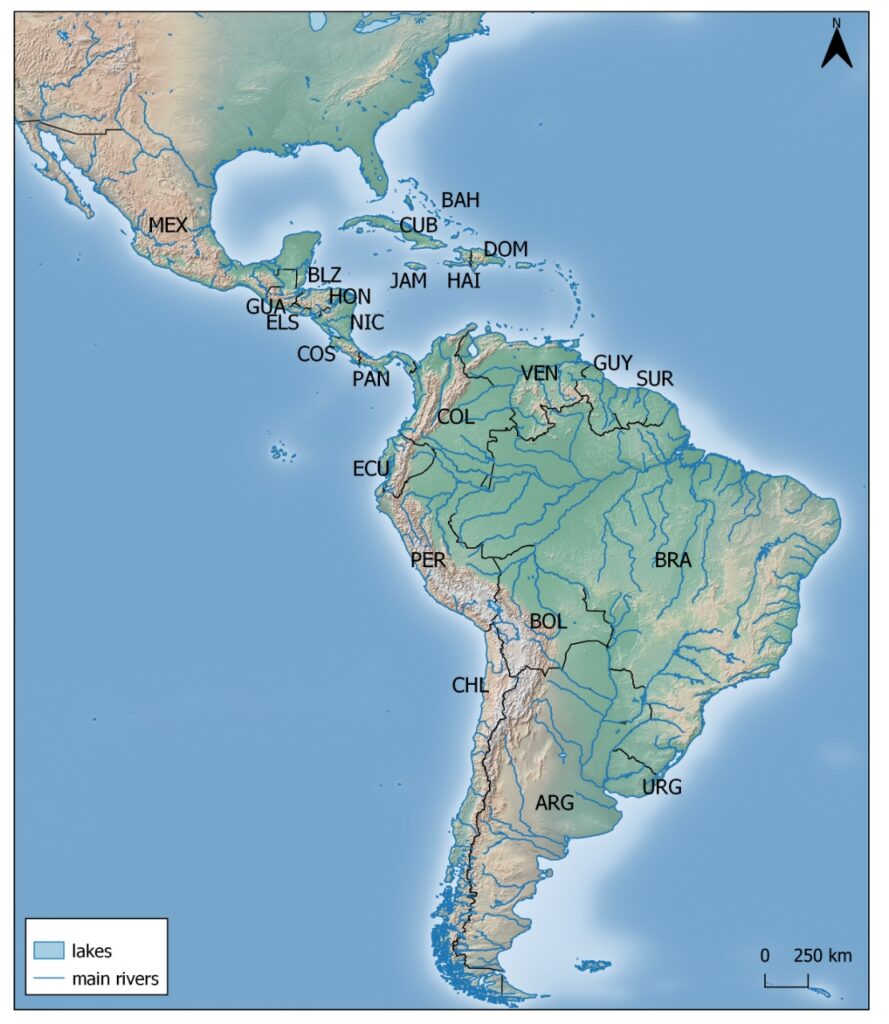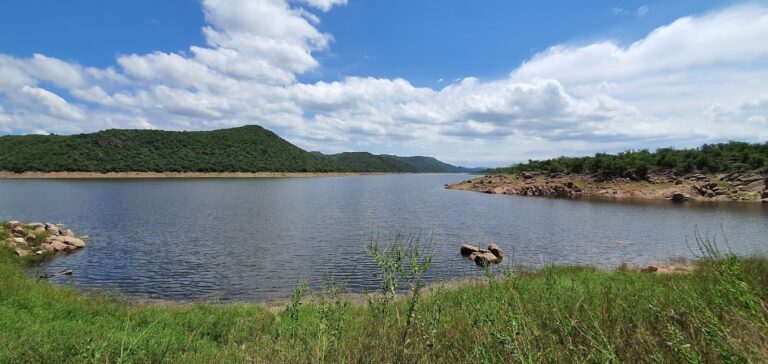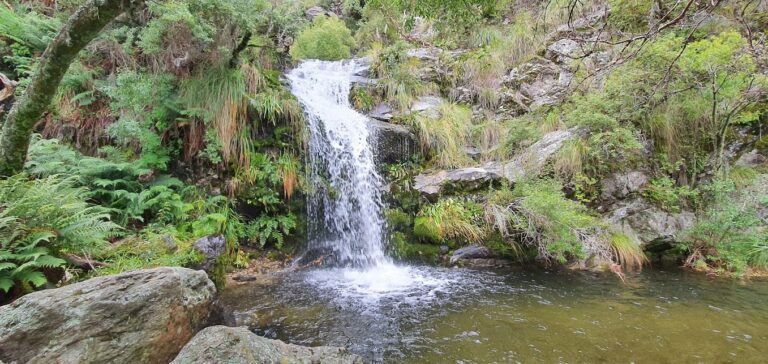IWRA Latin & Caribbean America Chapter
Background
Latin America is the most diverse continent in terms of water resources, where coexisting regions with great abundance of water with severe scarcity and an astonishing diversity of ecosystems and cultural differences related to water use. It presents the largest river basin on earth (the Amazon Basin), the driest desert (the Atacama desert), the longest mountain chain (the Andes), unique ecosystems (Amazon Forest), Mata Atlantica, Cerrado, Catinga, Pantanal, Gran Chaco and Bofedales) and traditional communities.
This diversity of natural elements, social and economic aspects highlights the importance of water governance in Latin America and Caribbean (LAC) countries. As such, there is an urgent need to support and encourage LAC countries’ water governance to protect water and develop its use in an equitable way, respecting the cultural differences and ecosystem needs, in the context of SDGs.
Climate change adds complexity to the LAC water situation. Chilean and Argentine Andes glaciers have been retreating during the last decade, meanwhile Amazonia and the Pantanal faced in 2020 the worst drought in the past 60 years, as well tropical storms and hurricanes affected Central America. Despite this, there are considerable gaps in research concerning several topics related to water governance and adaptation measures in the region. For these reasons the IWRA Executive Office established the Latin America and Caribbean Chapter on the theme of Water Governance based on science for mitigation, adaptation, and resilience as a Task Force.


Objectives
The Latin America and Caribbean (LAC) Chapter Bureau will focus on promoting knowledge about water governance to water professionals from academia, government and industry, young professionals, universities researchers and students, community leaders and representatives at all levels of government, including national and international agencies.
By facilitating this dialogue, the Chapter expects to:
- Stimulate the debate and reflection about water governance, promote the exchange of ideas between countries and
- Motivate better water policies and innovative actions to address Latin-American challenges.
- Become a catalyst to promote a comprehensive approach of water security and governance based on robust science for mitigation, adaptation, and resilience.
Specific Objectives
The LAC Chapter’s objective to expedite the discourse on the goals and ways forward to achieve water security and good water governance based on science for mitigation, adaptation, and resilience are the following:
● Highlight good practices and existing challenges of achieving water security and multilevel governance based on science for mitigation, adaptation, and resilience in the region.
● Definition of multilevel water governance based on the LAC reality (what does it mean, how we can assess urban water security, what are key challenges and opportunities).
● Strengthening the planning framework for defining the priorities to achieve water security in LAC countries and multilevel governance at different scales.
● Highlight the importance of international cooperation to overcome the LAC challenges


Ariana Rossen is a senior research scientist at the National Water Institute in Buenos Aires, Argentina with more than 20 years working in the water sector. She is a biologist and holds a master’s degree in biotechnology and a PhD from University of Buenos Aires. Besides, in 2014 got a Specialization/MBA in Innovation Management in Science and Technology from the Fundacão Getulio Vargas in Brazil. Her expertise areas are linked to water quality, biological treatability, ecotoxicology, environmental microbiology and Environmental and human health risk evaluation. She has experience in partnerships and cooperation capacity building at institutional level promoting projects and dialogue across water science in academia and governmental agencies. In the last years she was involved in promoting innovative technology development to secure safe drinking water to isolated and dispersed communities without an adequate supply. She is a tenured professor at Argentina Catholic University – UCA. She acted as a consultant for MERCOSUR and FAO projects. She also takes part in the SETAC Argentina Chapter and at the SETAC Latin-American scientific committee. She has publications in refereed journals and refereed conference proceedings and book chapters in the area of her expertise.
https://ar.linkedin.com/in/ariana-rossen-7a839477. ORSID:0000-0002-5342-3360

Guillermo Donoso is a professor at the Department of Agricultural Economics of the Pontificia Universidad Catolica de Chile. He obtained a Ph. D. in Agricultural and Resource Economics at the University of Maryland, College Park (1994), and a Bachelor in Agronomy from the Pontificia Universidad Catolica de Chile (1987). He is a researcher at the Water Law and Management Center of the Pontificia Universidad Catolica de Chile. His research focuses on Water Resources Economics, Water Allocation and Reallocation Mechanisms, and Collective Water Management.
For more than 25 years, he has researched issues related to water in a multidisciplinary context, with the aim of analyzing water management problems in a comprehensive manner, rather than through a fragmented approach, in order to contribute to the decision-making of agents and of political leaders and the design of effective public policies that leave no one behind.
He has published multiple scientific articles in international multidisciplinary journals on water (Water Resource Management, Water Alternatives, Water, Environmental Science and Policy, Environmental Science and Pollution Research, International Journal of Water Resources Development, among others), 2 books and more than 25 chapters of books.
 Pilar Carolina Villar is a Professor at the Sea Institute of the Universidade Federal de São Paulo (Federal University of São Paulo) – UNIFESP, Baixada Santista campus, Santos – SP, Brazil. She is also a professor of the Graduate Interdisciplinary Program in Marine Science and Technology (PPG-ICTMar is the acronym in Portuguese) and a member of the Legal Affairs Commission of the Baixada Santista Hydrographic Basin Committee. Pilar is a lawyer, Master and Doctor from the Graduate Program in Environmental Science (PROCAM) of the University of São Paulo and did postdoctoral studies at the Institute of Geosciences (USP). Her research focuses on multilevel water governance (local, regional, state, national transboundary). She has acted as a consultant in projects developed by the Organization of American States, UNESCO and the Brazilian National Water and Sanitation Agency (ANA).
Pilar Carolina Villar is a Professor at the Sea Institute of the Universidade Federal de São Paulo (Federal University of São Paulo) – UNIFESP, Baixada Santista campus, Santos – SP, Brazil. She is also a professor of the Graduate Interdisciplinary Program in Marine Science and Technology (PPG-ICTMar is the acronym in Portuguese) and a member of the Legal Affairs Commission of the Baixada Santista Hydrographic Basin Committee. Pilar is a lawyer, Master and Doctor from the Graduate Program in Environmental Science (PROCAM) of the University of São Paulo and did postdoctoral studies at the Institute of Geosciences (USP). Her research focuses on multilevel water governance (local, regional, state, national transboundary). She has acted as a consultant in projects developed by the Organization of American States, UNESCO and the Brazilian National Water and Sanitation Agency (ANA).
She has more than 10 years of experience in water analysis in the interdisciplinary perspective of water governance and management. Her area of research focuses on the Guarani Aquifer System and the La Plata River Basin. She has published multiple articles in international journals, books and book chapters. Link to her CV.

Félix Sebastián Riera is a postdoctoral researcher at CONICET-AACREA and visiting professor at the Chair of Agricultural Economics and Policy (Facultad de Ciencias Agrarias, Universidad Nacional de Cuyo). Sebastián holds a PhD in Agricultural Economics from the University of Göttingen. He obtained his master’s degree from the same University and the University of Talca. The core of his work is related to applied economics in production systems with special attention to the use of water resources and their integrated management, both from the perspective of efficiency in use and the circular economy.
He has more than 10 years of experience in multidisciplinary collaboration in comprehensive assessment of water resources and system governance.
biodiversity.

Rocío Janneth Vilaña Chungandro is a Technical Specialist in hydraulic engineering in the Sanitation Unit, Projects Engineering at Drinking Water and Sanitation Metropolitan Public Company, Ecuador. Rocío is a civil engineer – hydraulic mention of the National Polytechnic School, Ecuador and Master of Science of the Water Resources of the Sungkyunkwan University, South Korea. Her main area of research is centered in hydraulic engineering and hydrology.
She has more than 5 years of experience in hydraulic engineering, hydrology, water resources and water quality. Her research area is focused in hydraulic modeling and hydrology in the Coca River Watershed.
is the co-founder of the digital magazine Water Science Policy.
● Facilitate communication and interaction between other regional chapters and members of IWRA.
● Contribute and promote projects and initiatives on priority subjects for LAC countries.
● Support and coordinate initiatives developed by IWRA task forces in the LAC region.
● Encourage the promotion of science, technology, and the best practices through IWRA communication channels.
● Stimulate Policy Dialogues and Briefs – with policy makers, scholars, and practitioners.
Activities
To achieve the above objectives, the LAC Chapter will promote coherence and coordination with IWRA and its task forces through the following activities:
- Develop publication of articles, guides and manuals on related topics.
- Organise webinars, conferences, and workshops.
- Form coalitions with other international and national organisations in the region
- Promote and spread research papers and investigations.
Working Groups
- Water Security and Governance, social development and innovative solutions
- Groundwater: Governance and sustainable management
- Nexus water, food and energy.
- Water management balancing availability and quality
- Water access and sanitation
- Community and Youth engagement
Structure
The LAC Chapter Bureau will lead the IWRA LAC Chapter for Water Security and Governance based on science for mitigation, adaptation, and resilience. The main role of the bureau is to facilitate coordination and management, expand activities, and attract more members. Moreover, the chapter is led by Chapter members and is closely supported by both the IWRA Board and Executive Office. The LAC Chapter will create a number of working groups (WG) that have clear mandates, activities and deliverables with associated timelines on priority objectives for the Chapter.
For more information about the LAC Chapter, please contact the IWRA Executive Office at: office@iwra.org.
